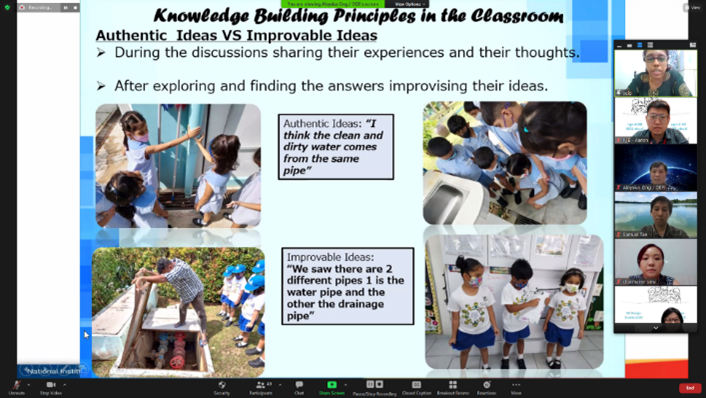KBC Network Learning - 29 March 2021
“How does Knowledge Building (KB) support students to learn and think like scientists?”
This question stood out among the many questions that were on the minds of participants as they attended the Knowledge Building Community Network Learning conducted on 29 March 2021. The network session showcased how students tackled real-world problems on ‘Sustainability and Environment’ in an authentic KB environment, to an audience of 58 participants including teachers (from preschool, primary, and secondary schools), researchers and leaders from the Ministry of Education, Institute for Adult Learning, and the National Institute of Education.
The first part of the session unfolded as NIE researcher Alwyn Lee shared how students came together to build knowledge on the theme of “Saving the planet, Saving Lives” at last year’s design studio (KBDS 2020). Guided by the KB principle of community knowledge and collective responsibility, students from different schools collaborated to create, share, and improve real ideas that can potentially resolve authentic problems. In the Design Studio, students were given the opportunity to interact with scientists from the Toronto Rehabilitation Institute (KITE) in Toronto, Canada, to understand the various approaches to problem solving, such as using simulation laboratories to conduct robust experimentations on novel prototypes for assistive living.
Unpacking of KBDS2020’s design on KF by Alwyn
Pointing out the important features of group and community discussion views on KF
KBDS 2020 was an opportunity for teachers’ professional development as they took on a researcher role during the Design Studio. Teachers engage each other by noting down observations of students’ collaboration in the design challenges and subsequently penned reflection notes within their own community on how this phenomenon can be tried in back in their schools and respective activities. Thereafter, six teachers and students who attended the KBDS2020 were invited to form a panel to share their experiences and reflections with the audience.
Panel discussions facilitated by Samuel (top left)
Students and teachers shared their experiences from KBDS2020
Samuel Tan, a lead specialist from MOE, facilitated the panel discussions, and students were first invited to share on how KBDS 2020 as a knowledge building environment provided the space and support to help them create and improve ideas to resolve authentic problems. KBDS2020 has also led them to start “thinking like scientists”, and to approach “big ideas” in a wider community beyond the current context, such as “Saving the planet, Saving lives”. Teachers also further commented about the unique aspects of the Design Studio that can enhance student learning and pedagogical practice in the classrooms (e.g., Student collaboration led to diversity of ideas that allows the community to rise above for deepening of understanding.
Samuel then summarised the insights from teachers and students, before presenting the use of e-pedagogy in the context of KBDS 2020 and the participants’ experiences. Samuel highlighted the following pointers:
The affordance of Knowledge Forum (KF), as an online community space that supports knowledge building and students’ interaction with members of different communities.
Students’ agency in the community, as they have the opportunity to work closely with each other and take on collective responsibility in the classroom. These e-pedagogy moves also allow for more democratic discourses when students are given more agency in their own learning.
Sharing on e-Pedagogy by Samuel
Samuel explaining potential technological applications
“Can Knowledge Building be used in the preschools?”
Why not? And can preschool children build knowledge?
Preschool teachers were invited to share how they and their students embarked on a KB learning journey to tackle real problems on the environment. In one instance, teacher Sulo from Sarada Kindergarten shared her lesson design on the topic of ‘Water’. Guided by the KB principle of “real ideas, authentic problems” and “improvable ideas”, she provided opportunities for students to question and answer the origins of water and where is waste water processed. She conducted field trips for students to observe the piping system around the school and to conduct simple experiments, such as testing different materials that can filter sediments in water. Teacher Sulo’s practice has shown that KB can indeed support rich learning experiences and deep inquiry among preschool children!
Knowledge building can be integrated into Home-Based Learning too!
Another teacher, Vaishnavi, shared how she implemented her lessons during the home-based learning (HBL) period, by facilitating discussions with her students on the respiratory system and students were to design masks with different materials and layers. She purposefully involved the parents to improve their children’s ideas, such as creating human lungs that students can “show and tell” when they return to the physical classroom. A short breakout session then ensued as preschool teachers took turns to interact with the other participants on queries regarding KB in the preschools.
Idea-Fiend Map used to showcase students’ ideas
Before the end of the session, our keynote speaker, Feng Xueqi from Hong Kong University, was invited to share how her designed analytics in a primary school supported students in the idea improvement process. The importance of student agency in KB was further emphasised as she showed how students used visualisations of the connections between student ideas to view emerging ideas and deepen their inquiries collectively as a class.
By providing students the appropriate support and environment, students have shown that they are keen to think and work like scientists. This KBCNL session has also demonstrated that knowledge building need not be age-limited and can be practiced in preschools and K-12 schools. We thank the participants who actively participated and contributed to this network session, and see you at the next Knowledge Building Community Network Learning session!










